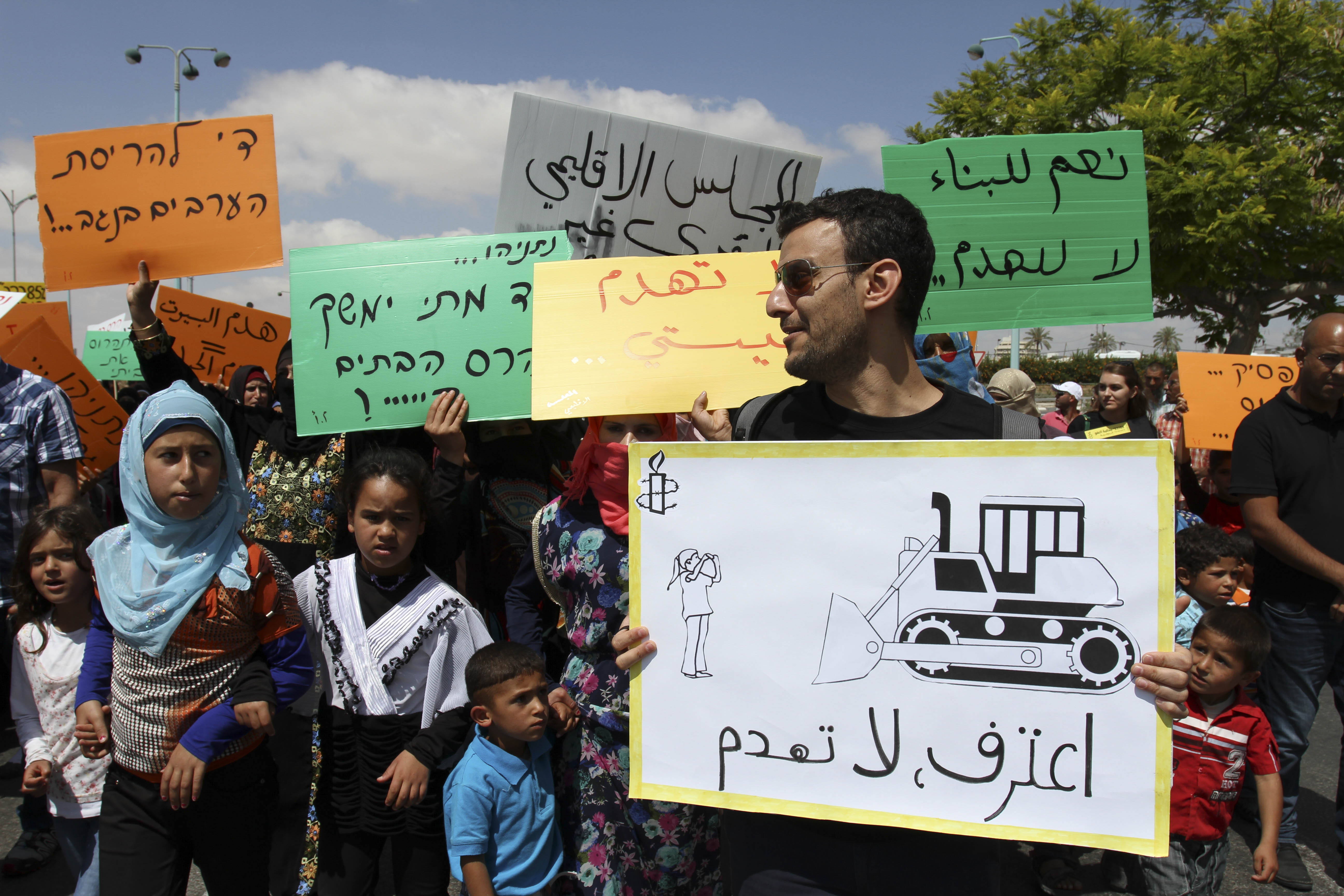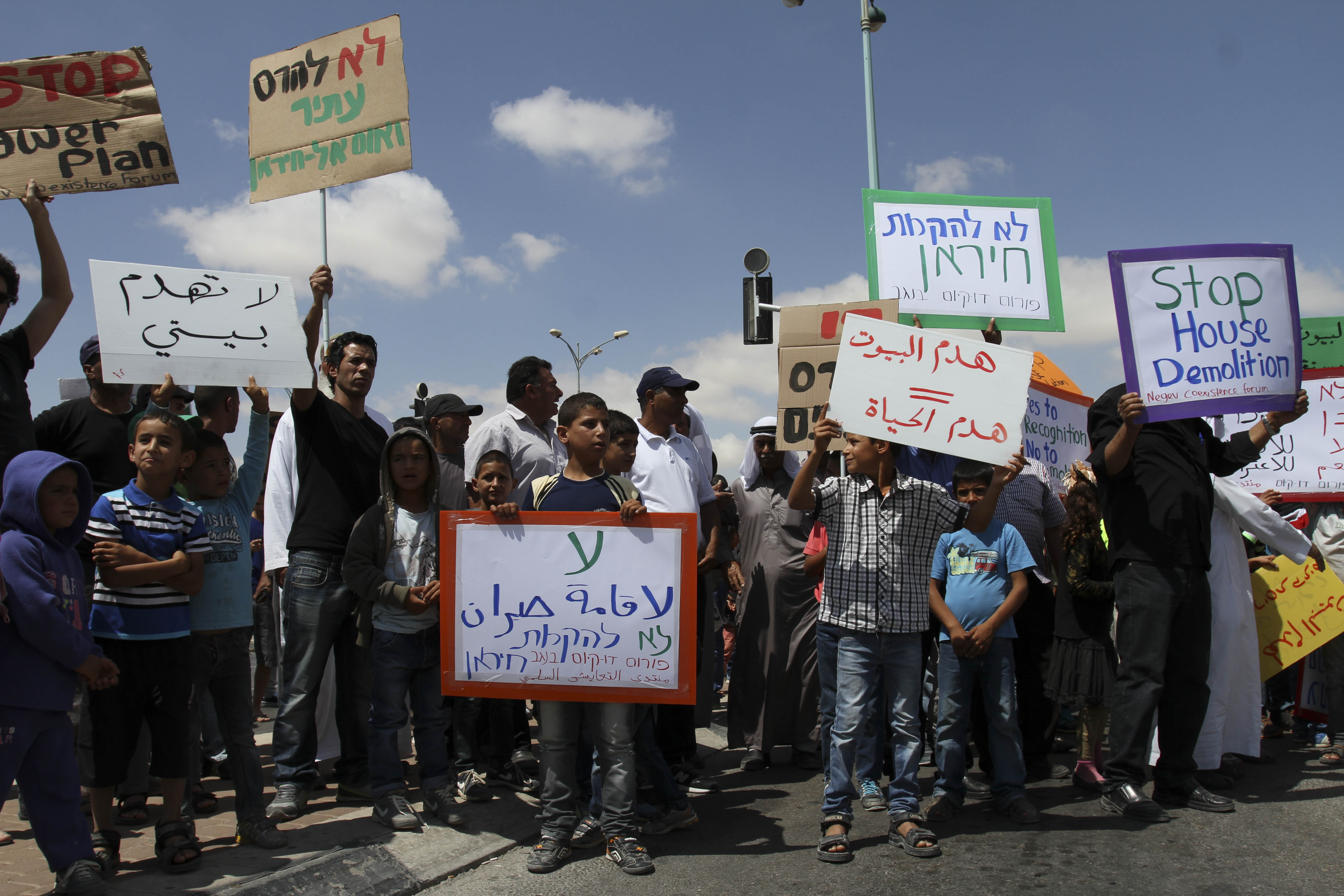Please sign the petition to
defend the rights of Bedouin residents of the village of Atir and Umm al-Hiran, initiated by the residents of Atir and Umm
al-Hiran, together with their partners, Amnesty International and several human
rights organizations in Israel. The deadline for signatures is 14
October 2015.
TO:
The Rt
Hon. Binyamin “Bibi” Netanyahu, Prime Minister of Israel
CC:
His
Excellency, Ruben Rivlin – President
Zion
Silvan Shalom – Minister of the Interior
Aryeh
Mahlouf Deri – Minister of the Economy and Minister of the Development of the
Negev and Galilee
Uri
Yehuda Ariel – Minister of Agriculture and Rural Development
Yoav
Galant – Minister of Construction
*
*
*
*
We are
writing to express our deep concern about the future of the Bedouin inhabitants
of Atir and Umm al-Hiran, an ethnic minority in Israel, who are under imminent
threat of forced eviction and demolition of their village.
The
villagers have resided on the lands of Atir and Umm al-Hiran, located in the
Northern Negev/Naqab area, since 1956, when they were relocated by direct order
from the Israeli Military Governorfrom an area now known as Laqiya. This came
after the villagers had already been forcibly moved by the military from their
original home in Khirbet Zbala following the creation of Israel in 1948.

Now,
sixty years later, it is reported that the Israeli Authorities are once again
denying the rights to housing and non-discrimination for the residents of Atir
and Umm al-Hiran., Despite the fact that they possess full Israeli citizenship,
Palestinian citizens of Israel, including Bedouins, are often discriminated
against in the field of housing. [1] In
the case of Atir and Umm al-Hiran, we understand that the residents have been
presented with an order of eviction that will be carried out in coming months
in order to resettle Jewish citizens on the same land.
Under
the current proposal, the residents would reportedly be forcibly relocated to
the nearby Bedouin township of Hura in order to make way for the construction
of the town of Hiran, which reportedly will only be accessible to Jewish
citizens of Israel in practice; as well as to expand Yatir Forest, the largest
forest in the Middle East. Contrary to the requirements of international law
binding on Israel the residents have not been consulted at all about the
proposed eviction and demolition. The UN Commission on Human Rights has
confirmed that forced evictions are a gross violation of human rights, and the
UN Committee on Economic, Social and Cultural Rights has affirmed that
evictions are only permitted under specified conditions, including when
affected people have had the opportunity for genuine consultation, adequate and
reasonable notice, and the possibility of pursuing legal remedies. The
Committee on Economic, Social and Cultural Rights has also expressed concerned
that the relocation of Arab-Bedouin villages in new settlements will negatively
affect their cultural rights and links with their traditional and ancestral
lands, and recommended that Israel fully respect the rights of the Arab-Bedouin
people to their traditional and ancestral lands. [2]

We wish
to affirm that all people residing in Israel has the right to adequate housing
– as guaranteed international human rights law –and this should be
respected without discrimination including on the grounds of ethnicity.
However, we are concerned that the Israeli Government’s policy of displacement,
forced eviction, house demolition and dispossession of ancestral land is
resulting in devastating, discriminatory and disproportional, impacts on the
fundamental rights of Palestinian citizens of Israel.
We
furthermore understand that the Israeli authorities have refused to recognize
dozens of Bedouin villages in the Negev/Naqab, including Atir-Umm al-Hiran,
which remain disconnected from basic infrastructure, including running water,
sewage networks and electricity. Israeli authorities have reportedly made
reference to the lack of access to essential services as a means to justify
forcibly relocating the residents to Hura. However, they have not attempted to
consult with the communities about other options such as connecting existing
villages to services. At the same time, Israel has also refused to consider
recognize Atir-Umm al-Hiran, along with 36 other unrecognized Bedouin villages
in Israel. [3]
We are
deeply concerned that the current proposal infringes upon the basic right to an
adequate standard of living of the Bedouin villagers, and that the Israeli
authorities would be in breach of international human rights law were the
proposed forced eviction and demolition to proceed as planned. We wish to
remind the Government of Israel that the right to housing is a fundamental
component of the right to an adequate standard of living as guaranteed under
Article 11 of the International
Covenant on Economic, Social and Cultural Rights (ICESCR), to which Israel is a party,
and central to the enjoyment of other human rights, including protection
against forced eviction, accompanying harassment and threats; guaranteed
security of tenure, sustainable access to safe drinking water sanitation and
other elements of the right to housing. In addition, Israel is also party
to the International
Convention on the Elimination of Racial Discrimination, which
prohibits discrimination on grounds of race and ethnicity in the exercise of
various rights including the right to housing.
Article
17 of the International
Covenant on Civil and Political Rights (ICCPR), protects against
arbitrary interference with one’s home, privacy and family which has been held
to include prohibiting forced evictions. Furthermore, as a State party to both
the ICCPR and ICESCR, Israel is obliged to ensure that any person whose rights
or freedoms have been violated under these treaties has the right to an
effective remedy.
As a
party to.
We, the
undersigned, concerned that Israel is in breach of its human rights obligations
in its treatment of the residents of Atir and Umm al-Hiran, and of its
Palestinian citizens of Israel more generally, call on Israel to:
1)
Respect and guarantee the human rights of all persons within its jurisdiction
without discrimination, including particularly vulnerable and marginalized
groups such as persons of Palestinian and Bedouin descent, consistent with the
above-mentioned international human rights treaties to which Israel is party.
2)
Refrain from carrying out forced evictions and demolishing homes, and respect
the right to be protected from arbitrary interference with one’s home, privacy
and family
3)
Commit to not carrying out any evictions until appropriate safeguards and
procedures are in place in line with international law including a provision
for genuine consultation with all affected residents.
4)
Take concrete steps to progressively realize the right to adequate housing for
all within a reasonable time, with measurable progress and to an extent
consistent with the maximum available resources to include:
- Security of
tenure for everybody, including an immediate grant of legal recognition
and/or status to the above-mentioned presently unrecognized villages in
Israel; - Availability of
services, materials, facilities and infrastructure, including sustainable
access to safe and potable drinking water, electricity, sanitation,
sewage, refuse disposal, emergency services, medical care and education
facilities; - Participation in
housing-related decision-making at the national and community levels; and - The adoption of appropriate
legislative, administrative, budgetary, judicial, promotional and other
measures to fully realize the right to adequate housing, including among
other steps, the adoption of a national housing policy that defines the
objectives for the development of the housing sector, with a focus on
disadvantaged and marginalized groups; identifies the resources available
to meet these goals; specifies the most cost-effective way of using them;
outlines the responsibilities and time frame for the implementation of the
necessary measures; and monitors results.
5)
Ensure access to effective remedy for violations of human rights, including
compensation, housing and property restitution, guarantee of non-repetition and
the availability of legal aid to those in need to be able to seek judicial or
other redress.
The letter is also available in French, Spanish, Arabic and Hebrew.
*Click here to endorse the petition
[1] Committee on the Elimination of Racial
Discrimination 2012 CERD/C/ISR/CO/14-16. At: http://www2.ohchr.org/english/bodies/cerd/docs/CERD.C.ISR.CO.14-16.pdf and Human Rights Watch – Israel: Court
Permits Discriminatory Evictions https://www.hrw.org/news/2015/05/19/israel-court-permits-discriminatory-evictions
[2] UN
Committee on Economic, Social and Cultural Rights, E/C.12/ISR/CO/3, Concluding
Observations, Forty-seventh session, 14 November-2 December 2011, Para 37
[3] See http://www.dukium.org/map/, “The unrecognized
villages bythe Regional Council of the Unrecognized Villages (RCUV)” from
the Regional Council of the Unrecognized Villages and Physicians for Human
Rights, at: http://www.phr.org.il/default.asp?PageID=128